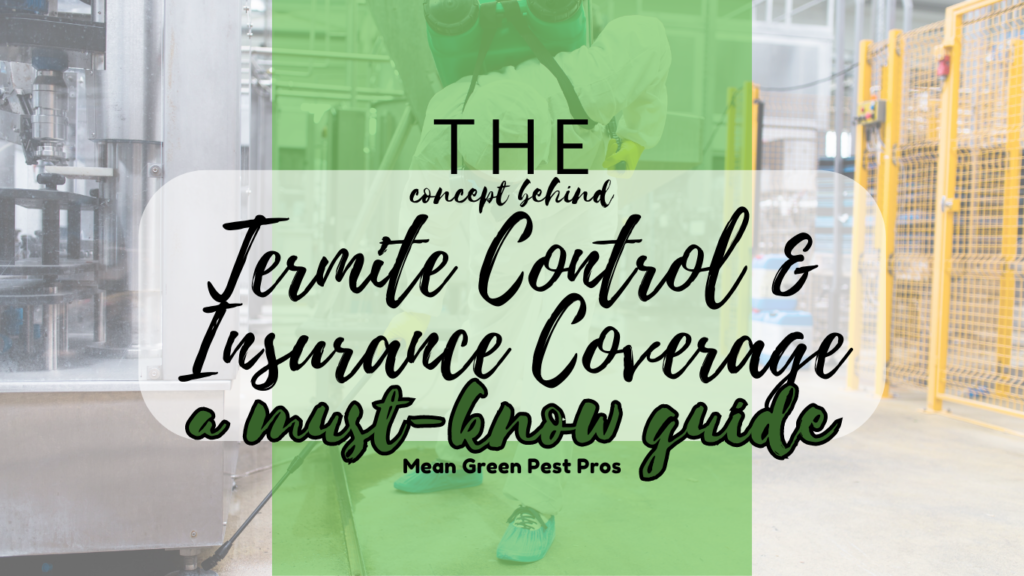
Understanding termite control and insurance coverage is crucial for every homeowner in Symrna, Tennessee.
Termites are a destructive force, causing significant property damage that can cost thousands to repair.
Recognizing the signs of termite infestations early can save you from extensive damage.
In this blog post, we delve into the concept behind termite control and insurance coverage by going over the complexities of homeowners insurance policies and why they often do not cover termite damage.
We’ll explore exceptions where coverage might be applicable and discuss how pest control companies offer plans that include annual inspections and treatment options.
We also emphasize preventive measures against termite infestations, such as diverting water away from house foundations and regular checks for changes in wooden structures.
The importance of professional intervention in case of suspected infestation will be highlighted as well, alongside the renter’s responsibilities when dealing with termites.
Join us on this journey to better understand termite control and insurance coverage, ensuring your home remains safe from these wood-eating pests.
Table Of Contents:
- The Destructive Power of Termites
- Termite Damage and Homeowner Insurance Policies
- Pest Control Plans: Keeping Pests at Bay, Saving You Dough.
- Preventive Measures Against Termite Infestations
- Why You Need Professional Help for Termite Infestation
- Renter’s Responsibility in Dealing with Termites
- FAQs in Relation to Termite Control and Insurance Coverage
- Does homeowners insurance cover termite damage?
- How can I prevent termite damage?
- What should I do if I find termites in my home?
- Does home insurance cover termite damage?
- How do termites cause damage to homes?
- Are there insurance policies specifically for termite damage?
- What organizations can provide information about termite control?
- Can termites eat through all types of wood?
- How often should termite inspections be conducted?
- Does homeowners insurance cover the cost of repairing termite damage?
- Protect your property from termite damage and explore insurance coverage options to ensure peace of mind.
The Destructive Power of Termites
Termites are a homeowner’s worst nightmare.
These pesky pests can cause an exorbitant amount of damage, resulting in a yearly expenditure of $5 billion for control and repair.
The NPMA estimates that dealing with termites and the damages they cause costs Americans a whopping five billion dollars each year.
That’s a lot of dough for some bugs.
Understanding Different Types Of Termites
Termites come in three flavors: subterranean, dry wood, and damp wood.
Subterranean termites are like the ninjas of the termite world, living underground and silently destroying your wooden structures.
Drywood termites prefer to hang out in your attic, munching away on dry wood, and damp wood termites, well, they’re the hipsters of the bunch, chilling in moist wood or decaying trees.
Recognizing Signs Of Termite Infestations
Spotting termite trouble early is key to saving your home from becoming a snack.
Look out for discarded wings near windowsills or doors – those are a sure sign of termite activity.
Mud tubes along walls or foundations are another red flag, and if you find damaged, hollowed-out wood or little piles of termite poop (which looks suspiciously like sawdust), it’s time to call in the big guns.
Don’t wait until your house is swarming with termites, like a bad horror movie.
So, remember, knowing your enemy is half the battle.
Understanding the different types of termites can help you take preventive measures.
Recognizing the signs of an infestation can save you from a termite-induced nightmare.
Stay vigilant, my friends.
Termite Damage and Homeowner Insurance Policies
Termites: the uninvited guests that can turn your home into their personal buffet.
Unfortunately, your standard insurance policy won’t be picking up the tab for their destructive feast.
Why insurance companies won’t cover termite damage
Insurance companies see termite damage as a result of neglect, like forgetting to take out the trash or skipping leg day at the gym.
They believe that regular inspections and quick action could prevent these tiny terrors from wreaking havoc on your home.
So, when it comes to termite damage, insurance companies say, “sorry, not our problem.”
It’s like expecting your insurance to cover the cost of a new treadmill because you didn’t use the old one.
Exceptions to the rule
But wait, there’s a glimmer of hope.
If you can prove that your termite problem is linked to a “covered peril” in your policy, like water damage or wood rot, you might have a shot at getting some coverage.
- Collapse: If those sneaky termites cause your house to collapse, some policies might come to the rescue. But don’t get too excited; the terms and conditions can be as confusing as a crossword puzzle.
- Add-on Coverage: For those who want extra protection against termite invaders, you can buy add-ons to your policy. Just be prepared to pay higher premiums for the privilege.
Before you start dreaming of termite-free bliss, remember to consult your insurer directly to understand the fine print.
Do not take anything for granted when dealing with the insurer, as each company has its own distinct set of regulations.
It’s akin to attempting to put a square block into an opening of a circular shape – it simply won’t succeed.
Pest Control Plans: Keeping Pests at Bay, Saving You Dough.
When it comes to termite control, prevention is key.
That’s where pest control plans come in.
These services offered by professional pest management companies like Mean Green Pest Pros include annual inspections and treatment options to keep those destructive pests in check.
Benefits of Professional Pest Control Plans
A professional pest control plan provides assurance that your residence is frequently evaluated by experienced specialists who are knowledgeable in their field.
If an infestation does happen, the cost of treatment is typically covered – saving you big bucks.
But that’s not all. Many plans also offer preventative treatments to keep termites from making themselves at home.
With eco-friendly options available, like Mean Green Pest Pros’ organic ingredients, you’re protecting both your home and the environment.
Comparing Costs: Prevention vs. Repairs
Dealing with termite damage can drain your wallet faster than a leaky faucet.
Americans spend over $5 billion each year on termite-related costs.
Preventing termite issues is much more economical and less intrusive than having to confront a full-blown infestation.
Think about it: a one-time termite treatment can cost between $500-$1500 while repairing post-infestation damages can easily reach tens or even hundreds of thousands of dollars.
So, investing in professional pest control services is a no-brainer.
It pays to take preventative measures before the problem worsens.
Preventive Measures Against Termite Infestations
When it comes to termites, prevention is the best way to avoid a “termite-nator” situation.
Take these steps to keep those pesky pests away from your home:
Divert Water Away From Foundations
Termites love moisture more than a kid loves candy. Keep your home dry by using proper yard drainage techniques.
Install gutters and downspouts to direct rainwater away from your foundation.
Make sure the ground slopes away from your house for good measure.
No water, no termites.
Regularly Check Wooden Structures
Inspect your wooden structures like a termite detective.
Look for hollow-sounding wood, small holes, or sagging floors.
If you spot any suspicious signs, call in the pest control pros.
They’ll handle those termites like a boss.
Don’t forget to check outdoor wooden elements like fences and decks.
Termites don’t discriminate.
Keep Wood Away From Soil
Give termites the cold shoulder by keeping at least an 18-inch gap between wood and soil.
This will make it harder for those sneaky subterranean termites to invade your home.
Check out this guide on how to create barriers against these wood-munching monsters.
Fix Leaky Faucets and Gutters
Leaky faucets and gutters not only waste water but also invite termites to the party.
Fix those leaks pronto to keep your home termite-free.
Remove Dead Trees and Stumps
Dead trees and stumps are like five-star hotels for termites.
Get rid of them to protect your property from termite invasions.
Why You Need Professional Help for Termite Infestation
If you suspect termites in your home, don’t DIY it; call the pros as soon as possible.
Those little buggers are sneaky, and DIY treatments just won’t cut it.
The Downside of DIY Termite Control
DIY methods can’t reach the heart of the problem.
Termites live deep underground, and your sprays and baits won’t do much against their massive colonies.
Plus, most homeowners don’t know a termite from a tomato.
Utilizing the wrong approach can be an exercise in futility, bringing about a waste of both cash and energy while possibly intensifying the issue.
Why You Need the Experts
Professional pest control is the way to go. Companies like Mean Green Pest Pros have the knowledge and tools to tackle termites head-on.
- Detection: Pros use fancy gadgets to find hidden colonies. No termite can hide from them.
- Treatment: They use safe and effective organic methods to kick those termites to the curb.
- Maintenance: After the job is done, they’ll keep an eye out for any comeback tours and give you tips to prevent future infestations.
So, don’t wait; call the experts and protect your home from those pesky termites.
Remember, prevention is better than a termite takeover.
Renter’s Responsibility in Dealing with Termites
Don’t let termites bug you just because you’re renting.
Renters have a role to play in termite control, so let’s understand your responsibilities and rights as a tenant.
No Coverage Under Renter’s Insurance
Surprise.
The renter’s insurance won’t cover termite damage.
Insurance companies think termites are preventable pests, not accidents or disasters.
So, if termites munch on your stuff, like furniture or clothes, your insurance won’t save the day.
Know this, so you can take precautions on time.
Report to the Landlord ASAP
If you suspect termites, tell your landlord right away. Ignoring the problem will only make it worse and more expensive to fix later.
Landlords have a legal obligation to keep the property habitable, which includes dealing with pests.
If you report early, eco-friendly extermination services like Mean Green Pest Pros can save the day without harming humans, pets, or the environment.
Take Action Against Termites
- Report promptly: Don’t delay. Let your landlord know as soon as you see signs of termites, like discarded wings or mud tubes. Time is of the essence.
- Keep it clean: A clean house won’t keep termites away, but it’ll make it harder for them to breed. So, tidy up and say goodbye to clutter.
- Avoid infested items: Be cautious about bringing in second-hand furniture or items that could harbor termites. Inspect thoroughly to avoid introducing new colonies.
Remember, dealing with termites isn’t just the homeowner’s problem.
Renters have a stake too.
So, be vigilant and take action to protect your living environment.
FAQs in Relation to Termite Control and Insurance Coverage
Does homeowners insurance cover termite damage?
Typically, homeowners insurance does not cover termite damage as it is considered a preventable issue.
It’s important to have separate termite insurance or take preventive measures to protect your property.
How can I prevent termite damage?
To prevent termite damage, regular termite inspections are recommended.
Additionally, ensuring proper maintenance, such as fixing moisture issues and sealing cracks, can help deter termites.
Working with a professional pest control company can provide effective termite prevention strategies.
What should I do if I find termites in my home?
If you discover termites in your home, it’s essential to contact a pest control company immediately.
They will assess the extent of the infestation and provide appropriate treatment to eliminate the termites and prevent further damage.
Does home insurance cover termite damage?
In general, standard home insurance policies do not cover termite damage.
Termite damage is often considered a maintenance issue that can be prevented through regular inspections and preventive measures.
How do termites cause damage to homes?
Termites primarily feed on wood and cellulose materials, causing structural damage by weakening the wooden components of a building.
They create termite tunnels and galleries within the wood, leading to structural instability if left untreated.
Are there insurance policies specifically for termite damage?
Some insurance companies offer specific termite insurance policies that provide coverage for termite damage.
It’s advisable to consult with your insurance provider to understand the available options.
What organizations can provide information about termite control?
The National Pest Management Association (NPMA) is a reputable organization that provides valuable resources and information on termite control methods and prevention techniques.
Can termites eat through all types of wood?
Yes, termites eat wood; in fact, termites are known to eat various types of wood.
They can cause damage to both softwoods and hardwoods, making it important to address termite infestations promptly.
How often should termite inspections be conducted?
Regular termite inspections are recommended, and the frequency may vary depending on factors such as location, climate, and history of termite activity.
Consulting with a pest control professional can help determine the appropriate inspection schedule for your property.
Does homeowners insurance cover the cost of repairing termite damage?
A: Generally, homeowners insurance does not cover the cost of repairing termite damage as it is considered a preventable issue.
Insurance typically covers sudden and accidental damage rather than damage resulting from long-term infestations.
It is important to take proactive measures to prevent termites and regularly inspect your property for signs of termite activity.
Protect your property from termite damage and explore insurance coverage options to ensure peace of mind.
Termite control and insurance coverage go hand in hand when it comes to protecting your home from these destructive pests.
While homeowner insurance policies typically don’t cover termite damage, investing in professional pest control plans can help prevent infestations and potentially costly repairs.
Regular inspections, treatment options, and preventive measures are key to avoiding the devastating effects of termites.
DIY treatments may not be effective in eradicating termites completely, so seeking expert assessment and a tailored treatment plan is crucial for long-term termite control.
Additionally, renters should promptly report any signs of infestation to their landlord, as renter’s insurance usually does not cover termite damage.
By taking proactive steps and seeking professional intervention, you can protect your home from the damaging impact of termites.
Contact Mean Green Pest Pros today to schedule an appointment!

.png)
.png)
.png)





